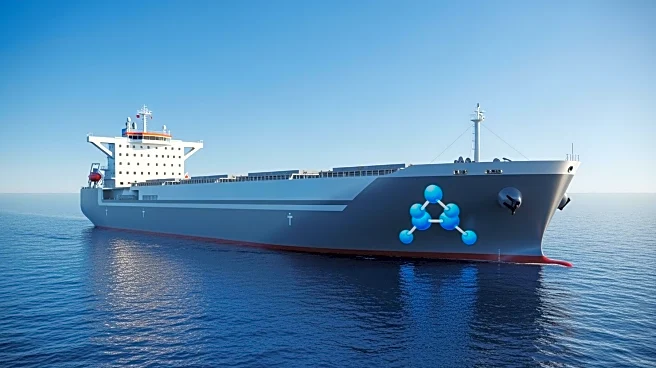What's Happening?
Beihai Shipyard, a subsidiary of China State Shipbuilding Corporation, has launched the first two large ammonia-fueled bulk carriers. These vessels, ordered by CMB.TECH for its operator Bocimar, represent a pioneering step in ocean-going ammonia-fueled shipping.
The Newcastlemax dry bulk carriers, each 300 meters in length and 210,000 dwt, are part of a larger order of 10 vessels equipped with ammonia-fueled propulsion. CMB.TECH has partnered with WinGD to develop the X72DF engine, capable of operating on ammonia. The project aims to lead the shipping industry towards alternative fuels, with the first ammonia engine installed in a gas carrier in South Korea earlier this year.
Why It's Important?
The launch of these ammonia-fueled bulk carriers marks a significant advancement in the maritime industry's efforts to reduce carbon emissions. Ammonia, as an alternative fuel, offers a cleaner option compared to traditional fossil fuels, aligning with global sustainability goals. This development could set a precedent for future shipping practices, encouraging more companies to invest in environmentally friendly technologies. The collaboration between CMB.TECH and WinGD highlights the potential for innovation in engine design, paving the way for broader adoption of alternative fuels in maritime transport.
What's Next?
CMB.TECH plans to deliver these vessels by 2026 and 2027, with some already chartered to companies like Mitsui O.S.K. Lines and Fortescue. As construction progresses, the maritime industry will closely watch the performance and efficiency of these ammonia-fueled ships. The success of this initiative could accelerate the adoption of ammonia as a viable fuel alternative, influencing future shipbuilding projects and regulatory frameworks. The industry will also monitor the environmental impact and operational challenges associated with ammonia-fueled propulsion.
Beyond the Headlines
The shift towards ammonia-fueled ships reflects a broader trend in the maritime industry towards decarbonization. This transition poses challenges, including the need for infrastructure to support ammonia bunkering and handling. Additionally, safety concerns related to ammonia's toxicity must be addressed through stringent regulations and training. The success of these initiatives could influence policy decisions and investment in green technologies, contributing to a more sustainable future for global shipping.
















